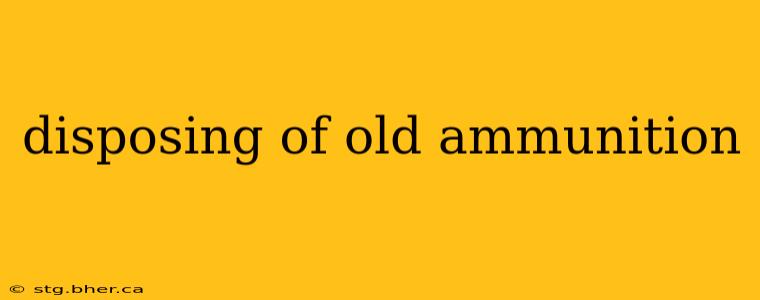Old ammunition presents a unique safety hazard. Improper storage can lead to dangerous misfires, and simply throwing it away is both illegal and environmentally irresponsible. This comprehensive guide will walk you through the safe and legal methods for disposing of old ammunition, ensuring both your safety and environmental protection.
Understanding the Risks of Improper Disposal
Before we delve into disposal methods, it's crucial to understand the potential dangers:
- Accidental Discharge: Old ammunition can become unstable over time, increasing the risk of accidental discharge. Rust, corrosion, and changes in the propellant can all contribute to unpredictable behavior.
- Environmental Contamination: Lead, a common component in ammunition, is a highly toxic heavy metal. Improper disposal can contaminate soil and water sources, harming wildlife and potentially humans.
- Legal Ramifications: Many jurisdictions have strict regulations regarding the disposal of ammunition. Improper disposal can lead to significant fines and legal penalties.
Safe and Legal Disposal Methods
The best method for disposing of old ammunition depends on your location and the amount of ammunition you need to dispose of. Always prioritize safety and legality.
1. Contact Your Local Law Enforcement Agency
This is often the easiest and safest option. Many police departments and sheriff's offices have designated programs for the safe disposal of firearms and ammunition. They will often have scheduled events or provide instructions on how to safely surrender your ammunition. This is particularly recommended for large quantities or if you're unsure about other disposal methods.
2. Licensed Firearms Dealers
Some licensed firearms dealers may accept old ammunition for disposal. However, this isn't universally available, so it's essential to call ahead and confirm their willingness to accept ammunition and their specific procedures. This is a good option for smaller quantities.
3. State and Federal Programs
Certain states and federal agencies may offer specific programs for ammunition disposal. Research your state's environmental protection agency or department of natural resources website for relevant information. These programs often cater to larger quantities or specific types of ammunition.
4. Ammunition Recycling Programs (Limited Availability)
While less common than other methods, some specialized recycling programs may exist in certain areas. These programs focus on responsibly reclaiming valuable materials from spent ammunition casings. However, these programs are typically limited in scope and availability.
Important Considerations:
- Never attempt to dismantle or tamper with ammunition. This is extremely dangerous and should never be attempted.
- Always transport ammunition securely. Use a sturdy container and ensure it's properly secured to prevent accidental spills or movement during transport.
- Check local regulations. Laws regarding ammunition disposal vary widely. Failing to comply with local ordinances can result in penalties.
Preventing Future Ammunition Disposal Issues
Proactive measures can significantly reduce the need for ammunition disposal in the future:
- Proper Storage: Store ammunition in a cool, dry, and secure location, away from direct sunlight and extreme temperatures. Use appropriate containers to prevent moisture and corrosion.
- Regular Inventory: Periodically check your ammunition supply to identify and dispose of old or questionable rounds.
- Responsible Purchasing: Only purchase the ammunition you need and avoid accumulating excessive quantities.
Disposing of old ammunition responsibly is crucial for safety and environmental protection. By following the guidelines outlined above and prioritizing safe practices, you can ensure the responsible and legal disposal of your old ammunition. Remember to always consult local regulations and contact your local law enforcement or relevant agencies for the most accurate and up-to-date information specific to your area.
